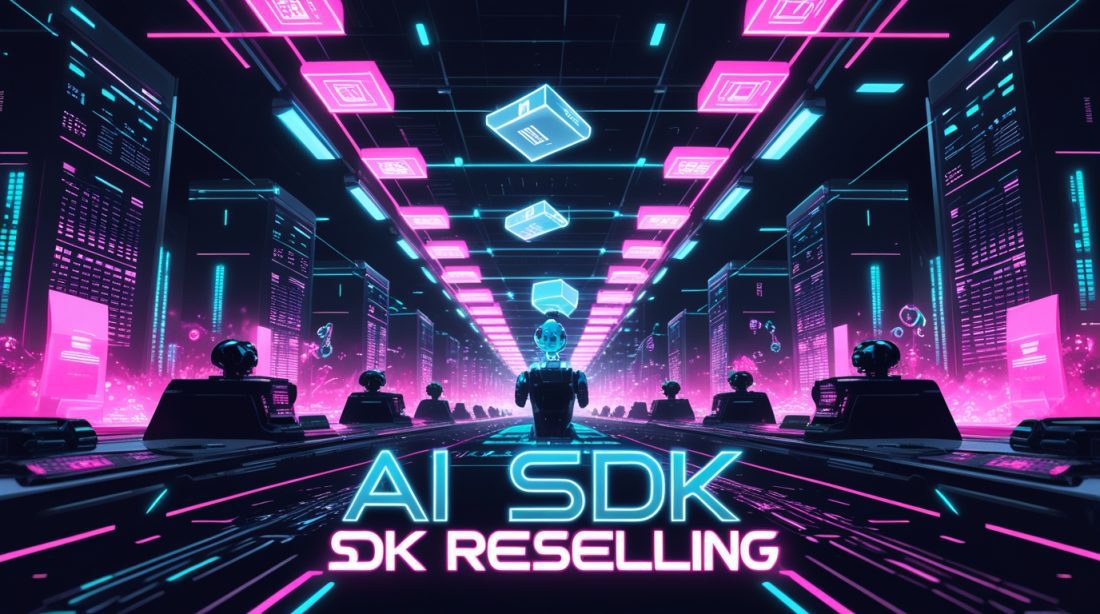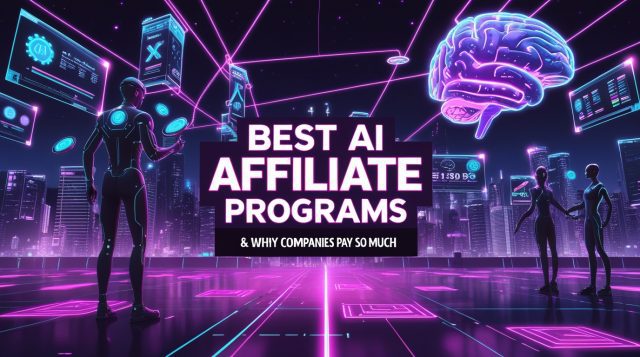In the sprawling $638 billion artificial intelligence market, a subtle but powerful shift is occurring away from the spotlight of consumer AI applications. While flashy chatbots and image generators dominate headlines, a lucrative opportunity has been quietly emerging in industrial sectors: the reselling of AI Software Development Kits (SDKs). This isn’t merely another affiliate marketing scheme; it’s a sophisticated business model allowing technical integrators to build sustainable passive income streams while accelerating AI adoption across traditional industries .
The numbers reveal why this market has become so compelling. The global AI SDK market specifically is experiencing robust growth, projected to expand at a CAGR of 25% from 2025 to 2033. What’s fueling this expansion? Industrial companies are desperately seeking tailored AI solutions but often lack the specialized skills or resources to develop them in-house . This creates the perfect environment for resellers who can bridge this gap by offering pre-built, customizable AI toolkits.
Why the AI SDK Market Is Primed for Reselling
The structural conditions for AI SDK reselling have emerged from two converging trends: explosive market growth and a critical skills shortage. The broader AI market is calculated to reach $3,680.47 billion by 2034, expanding at a CAGR of 19.20% from 2025 onward . Within this expansion, the AI SDK segment has developed particularly favorable characteristics for resellers.
Industrial firms face a dilemma: they recognize the urgent need to implement AI solutions to maintain competitiveness, but lack the specialized talent required. As one industry report notes, “The shortage or lack of skilled and qualified professionals creates a major challenge for the market”. This skills gap isn’t just an inconvenience—it’s a fundamental business constraint that SDK resellers are uniquely positioned to address.
“AI frameworks are the new runtime for intelligent agents, defining how they think, act, and scale. Powering these frameworks with real-time web access and reliable data infrastructure enables developers to build smarter, faster, production-ready AI systems.” — Ariel Shulman, Chief Product Officer, Bright Data
The democratization of AI through SDKs has created this reselling goldmine. Leading frameworks now offer capabilities that were previously the domain of AI research labs. Tools like LangChain, Microsoft’s AutoGen, and OpenAI’s Agents SDK provide modular components for building sophisticated AI agents, while platforms like Langflow offer low-code environments that make AI accessible to a broader range of developers .
How AI SDK Reselling Creates Passive Income
At its core, AI SDK reselling operates on a white-label business model that allows integrators to offer advanced AI capabilities under their own brand. “White-labeling AI tools lets you put your own brand on them,” explains one reselling guide. “This means you can offer custom AI solutions to clients, making your business look more professional and unique” .
The White-Label Advantage
The economics of this model are particularly compelling. Instead of spending months or years developing AI capabilities from scratch, resellers can leverage established SDKs to quickly launch AI-powered tools. This approach offers “instant scalability” and significant “cost savings” compared to in-house development . One analysis of the AI reseller market highlights that this strategy “significantly reducing development time and costs while expanding your service portfolio rapidly” .
Consider this fictional case study: *”At CreedTec, we helped a mid-sized manufacturing client implement a predictive maintenance solution using resold AI SDKs. Within six weeks, they had reduced equipment downtime by 34%—a transformation that would have taken over a year to develop in-house. The client gets a tailored solution, while we generate recurring revenue with minimal ongoing effort.”*
Customization for Industrial Applications
The true value in SDK reselling comes from customizing solutions for specific industrial applications. Rather than offering generic AI tools, successful resellers deeply understand particular domains—whether manufacturing, logistics, energy, or healthcare—and tailor their offerings accordingly .
This might involve:
- Configuring natural language processing SDKs for industrial documentation analysis
- Adapting computer vision toolkits for quality control inspection systems
- Implementing predictive maintenance solutions using machine learning SDKs
- Developing supply chain optimization tools using AI agent frameworks
What Makes AI SDK Reselling So Profitable
High-Value Industrial Niches
The profitability of SDK reselling isn’t uniform across all sectors. The most successful resellers focus on high-value niches where AI solutions can deliver measurable operational improvements. According to market research, the machine learning segment dominated the AI technology landscape with a 36.70% share in 2024, while generative AI is expected to grow at a significant CAGR of 22.90% from 2025 to 2034 .
Industrial applications tend to generate particularly strong returns because they solve expensive, tangible business problems. One SDK market analysis notes that “framework-dependent SDKs currently hold a larger market share than independent SDKs, as they leverage the extensive capabilities and community support offered by established frameworks like TensorFlow and PyTorch” .
Recurring Revenue Through Services
While the SDK licenses themselves create one revenue stream, the most successful resellers build sustainable income through complementary services. These might include:
- Implementation and integration services
- Customization and configuration
- Ongoing maintenance and support
- Training and workforce development
This service layer not only generates recurring revenue but also creates significant switching costs, making clients less likely to change providers once implemented. As one industry report observes, “The need for hardware-based artificial intelligence products was recognized as end-use applications that demanded lower power and higher performance” —a need that resellers can address through tailored solutions.
How to Start in AI SDK Reselling: A Strategic Approach
Selecting Your Niche and SDK Partners
The first critical step is identifying a specialized industrial niche where you can develop domain expertise. The most successful resellers don’t try to be everything to everyone; instead, they focus on specific vertical applications. As one market analysis notes, “SDKs are becoming increasingly specialized to meet industry-specific needs, from healthcare and finance to manufacturing and autonomous vehicles“.
When evaluating potential SDK partners, consider:
- Technical capabilities and flexibility of the SDK
- Licensing terms and resale rights
- Vendor support and training resources
- Community adoption and ecosystem development
- Roadmap and future development plans
Building Your Go-to-Market Strategy
Successful resellers develop a comprehensive approach that addresses both technical and commercial considerations. According to industry analysis, sales teams have traditionally “trailed other functions in adopting and benefiting from AI,” but the potential is too significant to ignore .
Your strategy should include:
- Clear messaging focused on specific business outcomes
- Demonstrable ROI for potential clients
- Implementation frameworks that reduce perceived risk
- Pricing models aligned with value delivery
- Case studies and proof points from early adopters
Overcoming Challenges in AI SDK Reselling
Navigating Vendor Lock-In and Technical Limitations
While the opportunities are significant, resellers must also navigate several challenges. Vendor lock-in represents a particular concern, as building your business on a single SDK platform creates significant strategic risk. As one technical analysis notes, “The fastest path is wiring everything to a single vendor SDK—until you picture the ‘Migration Plan’ slide and realize you traded speed for lock-in” .
Savvy resellers address this by:
- Utilizing provider-agnostic toolkits like Vercel’s AI SDK that let you “swap GPT-4 for Claude or Gemini without touching your React components”
- Developing abstraction layers that minimize dependency on any single SDK
- Maintaining multi-vendor relationships to preserve flexibility
- Staying current with SDK market developments and emerging alternatives
Addressing Implementation and Support Complexities
The technical complexity of AI systems presents another challenge. As one market analysis observes, “The system with artificial intelligence technology needs skilled professionals, whereas the shortage or lack of such skilled and qualified professionals creates a major challenge for the market” .
Successful resellers develop structured approaches to:
- Client education and expectation setting
- Implementation methodologies that break projects into manageable phases
- Comprehensive documentation and knowledge transfer
- Staged rollouts that demonstrate quick wins while building toward larger transformations
The Future of AI SDK Reselling: Trends to Watch
Several emerging trends are likely to shape the SDK reselling landscape in the coming years. The rise of edge AI represents a particularly significant development, with one analysis projecting that “the market for edge AI SDKs is anticipated to account for a significant portion by 2033”.
Other key trends include:
- Growing specialization in vertical-specific SDKs
- Increased emphasis on security and privacy capabilities
- Tighter integration with cloud platforms and development tools
- Advancements in AI agent frameworks that enable more sophisticated applications
As the market evolves, resellers who develop deep expertise in these emerging areas will be well-positioned to capitalize on new opportunities. The ongoing democratization of AI through improved SDKs will likely expand the addressable market while increasing competitive pressure on undifferentiated resellers.
Seizing the AI SDK Reselling Opportunity
The quiet boom of AI SDK reselling represents a legitimate opportunity for technical integrators to build sustainable businesses at the intersection of artificial intelligence and industrial transformation. Unlike many passive income opportunities, this model leverages genuine technical expertise to solve meaningful business problems while creating recurring revenue streams.
The market conditions are increasingly favorable: AI adoption is accelerating across industrial sectors, specialized skills remain scarce, and SDK capabilities continue to advance rapidly. For technical professionals who can navigate this complex landscape, AI SDK reselling offers a path to participate in the AI revolution while building a valuable business asset.
As organizations continue their digital transformation journeys, the role of SDK resellers as translation layer between advanced AI capabilities and practical business applications will only grow in importance. The time to establish position in this emerging ecosystem is now, before the quiet boom becomes a deafening roar.
Frequently Asked Questions About AI SDK Reselling
What are the startup costs for AI SDK reselling?
The initial investment varies significantly based on your approach. At a minimum, you’ll need to cover SDK licensing costs, which might range from hundreds to thousands of dollars annually depending on the platform. Additional costs include development resources for customization, marketing expenses, and potentially certification programs. Many successful resellers start by focusing on a single SDK platform before expanding their offerings.
How do I choose the right AI SDK to resell?
Evaluate potential SDK partners based on several criteria: technical capabilities and flexibility, licensing terms and resale rights, vendor support and training resources, community adoption, and the SDK’s development roadmap. Prioritize SDKs that align with your target industry’s specific needs and your team’s existing expertise.
What technical background is required?
While you don’t necessarily need deep AI research capabilities, successful reselling does require solid software development expertise, understanding of integration patterns, and enough AI knowledge to customize solutions and troubleshoot issues. Many resellers come from software development, system integration, or IT consulting backgrounds.
How do I differentiate my offering in a competitive market?
Focus on developing deep domain expertise in specific industrial verticals rather than offering generic AI solutions. Build comprehensive service wrappers around the core SDKs, including implementation, customization, training, and ongoing support. Develop specialized templates, frameworks, or pre-built components that accelerate implementation for common use cases in your target industry.
What are the most common pitfalls?
The most significant risks include vendor lock-in, underestimating implementation complexity, failing to properly scope projects, and neglecting to establish clear data governance and security protocols. Successful resellers mitigate these risks through careful vendor selection, structured implementation methodologies, and clear client communication.
Fast Facts
AI SDK reselling represents a legitimate passive income opportunity in 2025, driven by massive market growth ($638B in 2024) and industrial demand for customized AI solutions. Success requires focusing on specific niches, leveraging white-label SDKs, and building service layers that create recurring revenue while solving real business problems.
Further Reading & Related Insights
- How White-Label AI Dashboards Are Reshaping Industrial Markets → Explores the same white-label strategy behind SDK reselling, showing how branded AI tools drive client retention and recurring revenue.
- 5 Compelling Reasons the AI Partnership Revenue Share Model Is Dominating in 2025 → Breaks down how collaborative monetization models—like SDK reselling—are outperforming traditional licensing in industrial AI.
- SymphonyAI Iris Forge: The Fast-Deploy Industrial AI Platform Explained → A real-world example of rapid deployment platforms that SDK resellers can emulate or integrate with.
- The Rise of the Industrial AI Data Marketplace → Shows how SDK resellers can tap into data-driven ecosystems to enhance their offerings and build scalable service layers.
- Best AI Affiliate Programs and Why Companies Pay So Much → Adds context to the economics behind SDK reselling and affiliate-style models, especially for integrators building passive income.
Want to stay ahead in the rapidly evolving world of industrial AI? Subscribe to our newsletter for exclusive insights, market analysis, and expert perspectives delivered weekly to your inbox.


